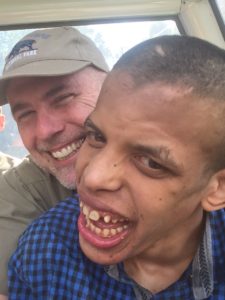Leadership Disabilities
The mythos of the superhero is not just in comic books, it is in executive offices, board rooms, branches, hospitals, airline cabins, schools, firehouses, …everywhere. Leaders are expected to be great at everything.
Yet, every person has disabilities. Really. We think we hide them, too, but the truly astute see them. Sometimes the disability is not being able to admit that one has a disability. Some company cultures have enshrined disabilities, and a common one is not being able to discuss its disabilities.
A dis-ability means that some useful ability is lacking to some degree – an impairment or condition that gets in the way of success. As we develop the self, some areas become more important to develop, and others fall into disuse or disrepair. I play the flute well because it mattered to me and I practiced the skill; the cello, not so much. Beside an ability to read music, I am disabled with the cello.
 Disabilities are not an assessment of character;abilities and disabilities are only a reflection of how well we can do something. That’s it. My oldest son, Kyle, is profoundly developmentally delayed, and he holds no notion to be anything other than who he is. He accepts himself, asks for help when he needs it, being fully whole in his own eyes. He is a mirror for how hard it is for “normal” people in our society to accept and speak generatively of their own abilities and disabilities. Being differently-abled in some areas is not an assessment of merit. Kyle’s straightforward ego is full of self-acceptance.
Disabilities are not an assessment of character;abilities and disabilities are only a reflection of how well we can do something. That’s it. My oldest son, Kyle, is profoundly developmentally delayed, and he holds no notion to be anything other than who he is. He accepts himself, asks for help when he needs it, being fully whole in his own eyes. He is a mirror for how hard it is for “normal” people in our society to accept and speak generatively of their own abilities and disabilities. Being differently-abled in some areas is not an assessment of merit. Kyle’s straightforward ego is full of self-acceptance.
I just watched the movie Patch Adams (again), where Robin Williams plays a medical school student in a story based in truth. He makes it his purpose to unwind the disabilities in the medical school teachers and students who, at the time, were taught to master the science of medicine and to view the human patients as objects. The various antagonists are empathy-disabled by a hyper-focus on objectivity. Sometimes, our disabilities arise when we focus solely on one ability to the detriment of others that could be useful. In the movie, it was science at the cost of empathy. The science has since proved Patch Adams’ hypotheses as correct, where empathy produces outstanding medical results. The accepted disability in empathy turned out to produce poorer medical outcomes. Who knew?!
The strongest, most vibrant, and thriving cultures provide the safe environment for disabilities to be discussed. These cultures create a secure and supportive place for open dialog about competencies and abilities that are needed for operations and initiatives, and appropriate assessments of leadership. Increase your competence at speaking and hearing various competencies as things we can do, and not as a reflection of who we are. The needed abilities to find success are changing all the time in today’s world; build the openness in your culture to have direct dialog as new needs surface.
Download the PDF here: Disabilities in Leadership

